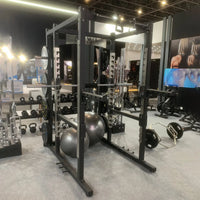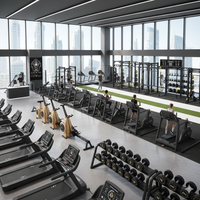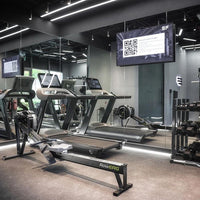The flooring requirements for home gyms and commercial gyms in Dubai differ significantly. While both demand safety, durability, and performance, the type of exercises, equipment usage, and overall environment determine the right choice. For gym flooring in Dubai, rubber remains a top option for both settings, but the thickness, type, and installation may vary. This article will explore the key differences between home gym flooring and commercial gym flooring, helping you make the best decision for your specific gym setup.
Home Gym Flooring: Meeting Personal Fitness Needs
1. Space and Equipment Considerations for Home Gyms
Setting up a home gym often involves limited space, usually in a spare room, garage, or basement. The flooring for a home gym needs to cater to personal workout preferences and the types of equipment being used.
- Compact Equipment: Home gym equipment in Dubai typically includes treadmills, stationary bikes, dumbbells, and multi-functional machines. Flooring should support both bodyweight exercises and the weight of lighter equipment.
- Space Efficiency: Since home gyms usually occupy a smaller space, modular flooring options like rubber tiles are ideal for customized layouts.
2. Flooring Material for Home Gyms
The most popular choice for home gym flooring is rubber due to its versatility and ease of installation. Rubber flooring offers shock absorption, which is essential for protecting both the floor and the body during workouts.
- Rubber Tiles: Perfect for small areas, rubber tiles allow flexibility and can be installed easily without professional assistance.
- Interlocking Mats: These offer a quick solution for those looking to cover smaller spaces or accommodate light equipment like yoga mats, dumbbells, or a bench press.
- Foam Flooring: While not as durable as rubber, foam flooring is soft and comfortable for activities like yoga or Pilates.
3. Durability and Safety in a Home Gym Setting
For a home gym where fewer people work out daily, flooring doesn’t have to withstand the same level of wear and tear as in a commercial gym. However, safety remains a key factor.
- Slip Resistance: Rubber flooring offers a non-slip surface, even when wet, ensuring that home workouts are safe.
- Joint Protection: Rubber flooring absorbs shock, reducing strain on joints during high-impact exercises like jumping or running.
4. Aesthetic Appeal
Many homeowners in Dubai seek not only functionality but also aesthetics for their home gym. Rubber flooring comes in a variety of colors and designs, allowing gym owners to match their space with their home decor.
- Customizable Options: Home gym owners can choose different designs and patterns, making the space visually appealing.
Commercial Gym Flooring: Built for High Traffic and Heavy Use
1. Space and Equipment Needs for Commercial Gyms
Commercial gyms see heavy foot traffic and constant use of heavy-duty equipment like squat racks, benches, free weights, and cardio machines. The flooring in commercial gyms must withstand intense daily usage from hundreds of members.
- Heavy Equipment: Commercial gyms in Dubai feature a wide range of equipment, from free weights to large machines. The flooring must handle the impact of dropped weights and protect both the equipment and subfloor.
- High Traffic: With numerous members working out simultaneously, the flooring must be durable enough to resist wear and tear over time.
2. Flooring Materials for Commercial Gyms
Commercial gym flooring often needs to be thicker and more resilient than home gym flooring. Rubber flooring is typically the go-to choice for commercial settings due to its durability and shock absorption capabilities.
- Rubber Rolls: Commercial gyms typically use rubber rolls, which cover larger areas seamlessly and provide a uniform surface for members to work out on.
- Poured Rubber Flooring: This is a more permanent solution for gyms with high-impact zones, offering superior durability and seamless installation.
- High-Density Rubber: For weightlifting areas, thicker, high-density rubber flooring is necessary to prevent damage from dropped weights and protect the floor underneath.
3. Durability and Safety in Commercial Gyms
With heavy equipment and constant foot traffic, the durability of commercial gym flooring is crucial. Rubber flooring, especially when installed as thick rolls or mats, offers superior protection and longevity.
- Impact Resistance: Rubber absorbs the impact of dropped weights, protecting the subfloor from cracks and dents.
- Safety Compliance: Commercial gyms need flooring that complies with safety regulations, including anti-slip properties, fire resistance, and the ability to absorb noise.
4. Noise Reduction
In commercial settings, noise reduction is critical to maintaining a pleasant workout environment. Rubber flooring significantly reduces the sound of weights hitting the ground and machines in use.
- Soundproofing: Rubber flooring’s sound-dampening properties make it an ideal choice for noisy gym environments, especially in multi-story buildings.
Home Gym Equipment in Dubai: Choosing the Right Flooring
When setting up a home gym in Dubai, pairing the right flooring with your equipment is key to building a functional and safe workout environment.
1. Flooring for Weight Training
If your home gym includes free weights, barbells, or dumbbells, you’ll need flooring that can handle the load without damage.
- Rubber Mats: For weight training, rubber mats offer sufficient shock absorption and prevent damage to both the floor and your equipment.
2. Flooring for Cardio Workouts
Cardio workouts often involve treadmills, ellipticals, and stationary bikes. The flooring needs to support the machines and absorb the vibrations to minimize noise and wear.
- Vibration Reduction: Rubber flooring reduces vibrations from cardio machines, which can be important in apartments or high-rise buildings in Dubai.
Commercial Gym Flooring: Considerations for High-Performance Spaces
1. Flooring for Strength Training Zones
For commercial gyms, strength training areas need extra-thick flooring to withstand the impact of heavy weights being dropped.
- Thicker Rubber Flooring: These areas typically require flooring that is at least 8mm thick to provide the necessary protection and support.
2. Flooring for Cardio Zones
In commercial gyms, the cardio zone may require a thinner rubber flooring since these machines don't exert as much force on the floor as weight training equipment.
- Durable Rubber Rolls: These can cover large areas efficiently while offering enough support for machines like treadmills and ellipticals.
3. Flooring for Functional Training Areas
Functional training zones, which include bodyweight exercises, kettlebell swings, and circuit training, need versatile flooring that offers grip and shock absorption.
- Rubber Flooring with Grip: For functional training, rubber flooring with a textured surface provides better grip and safety for dynamic movements.
Gym Flooring in Dubai: Finding the Right Flooring Solution
Choosing the best gym flooring in Dubai depends on several factors, including the type of gym (home or commercial), workout style, and equipment used. Both home and commercial gyms benefit from the durability, safety, and noise reduction that rubber flooring offers.
1. Durability for Dubai's Climate
Rubber flooring is resistant to heat and moisture, making it ideal for Dubai’s climate. Whether in a commercial gym or home gym in Dubai, rubber flooring holds up well against humidity and temperature fluctuations.
2. Sourcing Gym Flooring in Dubai
Many suppliers offer high-quality rubber flooring in Dubai, ensuring that both home and commercial gyms get the best flooring solutions.
- Garner Fitness Suppiles: A leading supplier of rubber flooring for gyms in Dubai, offering options for both home and commercial spaces.
- Anatomy Fitness: Known for high-end gym equipment, Anatomy also provides premium rubber flooring for gyms.
Key Differences Between Home Gym Flooring and Commercial Gym Flooring
The choice between home gym flooring and commercial gym flooring depends on the scale of use, type of equipment, and space availability. Home gym flooring tends to focus more on comfort, aesthetic appeal, and ease of installation, while commercial gym flooring requires high durability, impact resistance, and noise reduction. Regardless of the setting, rubber flooring offers the best solution for both home gyms and commercial gyms in Dubai.




0 comments